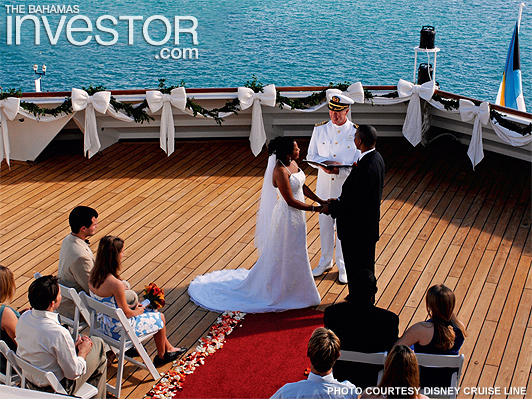| Published: Date: Updated: Author: |
The Bahamas Investor Magazine January 21, 2015 January 21, 2015 Tosheena Robinson-Blair |
Australians Wesley Bower and Celeste Paget were married on the high seas just off the French overseas territory of New Caledonia. Their wedding may have been in the southwest Pacific Ocean, but it was registered in The Bahamas. The Bower-Paget union is part of a growing trend for such ceremonies on the open seas and The Bahamas is hoping to develop a new revenue stream through granting such maritime marriage licenses.
Thanks to romantic Hollywood blockbusters, many couples dream of a fairy tale nautical wedding with the belief that any ship captain can carry out marriages at sea. However, this is not the case and up until the late 1990s, no such ceremonies had occurred on-board a major cruise ship. Due to pioneering efforts by Princess Cruises in developing the concept of legal weddings at sea, with the introduction of its wedding chapel aboard the Grand Princess in 1998, cruise ship weddings are now increasing in popularity.
Nautical nuptials
The Bahamas has made inroads into this market by creating the Maritime Marriage Act, which was passed in 2011. With one of the world’s largest ship registries, The Bahamas has ships flying its flag in every corner of the globe, according to the Bahamas Maritime Authority. A wedding that takes place on-board a Bahamian registered passenger ship on the nation’s territorial waters, or on the high seas (that is, waters outside the boundaries of any state or territory) is now eligible to be recognized as
a Bahamian wedding under the act.
Targeting a potential gap in the market, it was the cruise ship operators that approached the government over the possibility of maritime marriages. Initially, the idea was met with resistance. Some quarters feared it would adversely impact land-based destination weddings at some of the nation’s top resorts. However, the government decided that the revenue garnered would outweigh any negative impact on existing business and pushed the act through. At this point, land-based wedding service providers say they have yet to witness a fall-off in business.
To facilitate the development of this niche market, the legislation makes it relatively painless for captains to apply to become marriage officers. They must first submit a completed application to the Registrar General’s Department. In the Act, the ship’s captain is called its “master.” The ship’s master includes every person (except a pilot) having command or charge of any ship. Licenses for provisional marriage officers are also available to a ship’s second in command.
The master’s application is then forwarded to the registrar of shipping accompanied with a certificate of the applicant’s qualification to be a marriage officer and a letter of appointment to serve on-board a Bahamian ship. On being satisfied that the application contains sufficient information to enable it to be considered, the registrar of shipping sends the information back to the registrar general with a recommendation on the application.
Revenue generation
It was nearly two years after the Maritime Marriage Act was passed that the first Bahamas registered wedding at sea took place. The first cruise line to take advantage of the new Act was Royal Caribbean International. A global cruise line with 22 ships, Royal Caribbean calls on more than 270 destinations in 72 countries across six continents, according to the corporation.
On February 6, 2013, on-board the Radiance of the Seas, best known for its floor to ceiling glass walls and panoramic views, Captain Bo Göran Petersson married Bower, a sales manager, and Paget, a nurse. Another 58 couples tied the knot that year and in 2014, 78 couples had wed up to October 16.
According to registrar general Deirdre Clarke-Maycock, interest in maritime marriages is picking up. “A London-based ferry company expressed an interest, as well as a couple of small vessel companies,” says Clarke-Maycock, who oversees 12 sections of the registration, which includes marriages, deeds and copyright, of public records for posterity. “Another big cruise line showing some interest is Norwegian Cruise Line.”
The value to The Bahamas in terms of revenue could prove to be extensive, if this trend continues. “It costs $1,000 per registration per ship,” says Audrey Demeritte, a clerk in the Maritime Marriages Section of the Registrar General’s Department. “If captains are transferred to another ship they pay another $1,000.” The licence is good for one year per ship. The renewal fee is $750. There are also fees associated with the actual ceremony. Couples pay a marriage licence fee of $300. They also pay $250 to have their intended marriage advertised in two of the local dailies. The money is collected by the cruise line and remitted to the Registrar General’s Department.
“After the wedding is finished, they need to obtain a certified copy of their marriage certificate, which costs $50,” says Demeritte. It also has to be stamped at the Ministry of Foreign Affairs, because it is going outside the country, and that is $10.
The Registrar General’s Department declined to disclose the amount of revenue generated by maritime marriages thus far, but Clarke-Maycock is optimistic about its possible future growth as a money earner for the jurisdiction. “I think maritime marriages could assist greatly in generating revenue,” she says. “It has been very successful financially so far.”










